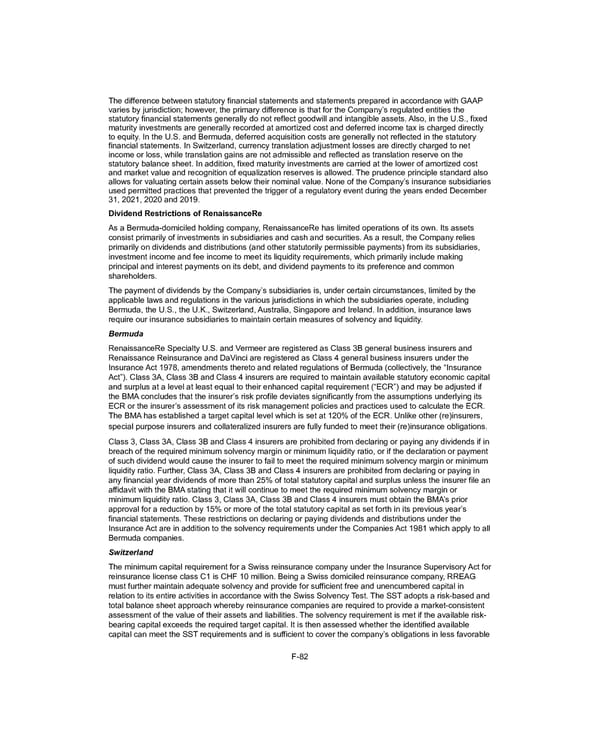The difference between statutory financial statements and statements prepared in accordance with GAAP varies by jurisdiction; however, the primary difference is that for the Company’s regulated entities the statutory financial statements generally do not reflect goodwill and intangible assets. Also, in the U.S., fixed maturity investments are generally recorded at amortized cost and deferred income tax is charged directly to equity. In the U.S. and Bermuda, deferred acquisition costs are generally not reflected in the statutory financial statements. In Switzerland, currency translation adjustment losses are directly charged to net income or loss, while translation gains are not admissible and reflected as translation reserve on the statutory balance sheet. In addition, fixed maturity investments are carried at the lower of amortized cost and market value and recognition of equalization reserves is allowed. The prudence principle standard also allows for valuating certain assets below their nominal value. None of the Company’s insurance subsidiaries used permitted practices that prevented the trigger of a regulatory event during the years ended December 31, 2021, 2020 and 2019. Dividend Restrictions of RenaissanceRe As a Bermuda-domiciled holding company, RenaissanceRe has limited operations of its own. Its assets consist primarily of investments in subsidiaries and cash and securities. As a result, the Company relies primarily on dividends and distributions (and other statutorily permissible payments) from its subsidiaries, investment income and fee income to meet its liquidity requirements, which primarily include making principal and interest payments on its debt, and dividend payments to its preference and common shareholders. The payment of dividends by the Company’s subsidiaries is, under certain circumstances, limited by the applicable laws and regulations in the various jurisdictions in which the subsidiaries operate, including Bermuda, the U.S., the U.K., Switzerland, Australia, Singapore and Ireland. In addition, insurance laws require our insurance subsidiaries to maintain certain measures of solvency and liquidity. Bermuda RenaissanceRe Specialty U.S. and Vermeer are registered as Class 3B general business insurers and Renaissance Reinsurance and DaVinci are registered as Class 4 general business insurers under the Insurance Act 1978, amendments thereto and related regulations of Bermuda (collectively, the “Insurance Act”). Class 3A, Class 3B and Class 4 insurers are required to maintain available statutory economic capital and surplus at a level at least equal to their enhanced capital requirement (“ECR”) and may be adjusted if the BMA concludes that the insurer’s risk profile deviates significantly from the assumptions underlying its ECR or the insurer’s assessment of its risk management policies and practices used to calculate the ECR. The BMA has established a target capital level which is set at 120% of the ECR. Unlike other (re)insurers, special purpose insurers and collateralized insurers are fully funded to meet their (re)insurance obligations. Class 3, Class 3A, Class 3B and Class 4 insurers are prohibited from declaring or paying any dividends if in breach of the required minimum solvency margin or minimum liquidity ratio, or if the declaration or payment of such dividend would cause the insurer to fail to meet the required minimum solvency margin or minimum liquidity ratio. Further, Class 3A, Class 3B and Class 4 insurers are prohibited from declaring or paying in any financial year dividends of more than 25% of total statutory capital and surplus unless the insurer file an affidavit with the BMA stating that it will continue to meet the required minimum solvency margin or minimum liquidity ratio. Class 3, Class 3A, Class 3B and Class 4 insurers must obtain the BMA’s prior approval for a reduction by 15% or more of the total statutory capital as set forth in its previous year’s financial statements. These restrictions on declaring or paying dividends and distributions under the Insurance Act are in addition to the solvency requirements under the Companies Act 1981 which apply to all Bermuda companies. Switzerland The minimum capital requirement for a Swiss reinsurance company under the Insurance Supervisory Act for reinsurance license class C1 is CHF 10 million. Being a Swiss domiciled reinsurance company, RREAG must further maintain adequate solvency and provide for sufficient free and unencumbered capital in relation to its entire activities in accordance with the Swiss Solvency Test. The SST adopts a risk-based and total balance sheet approach whereby reinsurance companies are required to provide a market-consistent assessment of the value of their assets and liabilities. The solvency requirement is met if the available risk- bearing capital exceeds the required target capital. It is then assessed whether the identified available capital can meet the SST requirements and is sufficient to cover the company’s obligations in less favorable F-82
 2021 Annual Report Page 224 Page 226
2021 Annual Report Page 224 Page 226